Researching Nazareth changemakers
One way to be a changemaker is to take a risk and be the first to do something — like the first Black student to attend Nazareth in 1944, the first Nazareth students to study abroad (by ship!) in 1964, and the students who started a student club in 1985 called Lambda that supported lesbian, gay, bisexual, transgender and queer/questioning (LGBTQ) students.
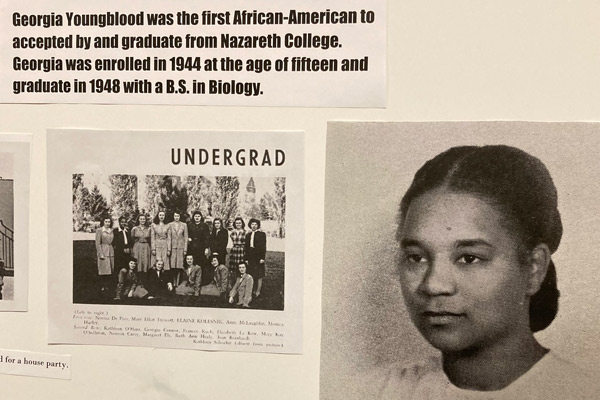
Trailblazer: Georgia Youngblood, who graduated in 1948, came to Nazareth from Texas.
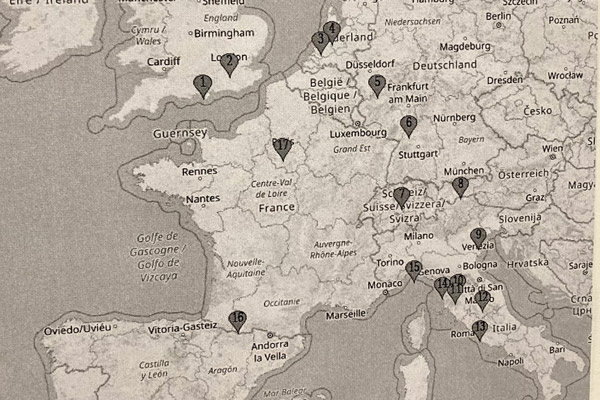
In 1964, 34 students and three faculty members sailed on the Queen Elizabeth ocean liner to study abroad in Europe.
When history Professor Tim Kneeland assigned his Public History class to research Nazareth changemakers, students chose individuals, groups, and the institution's graduate programs to research.
"This is something we can learn from," said Elyse Gosney '22 (English, communication and media major), part of the group who researched Lambda. The club sparked both controversy and conversation. It was formed when AIDS was a new and not-yet-understood health crisis and stigma was high toward LGBTQ people. Gosney was struck by "the bravery they had in choosing to come forward. They could have stayed silent. They paved the way."
Hannah Stasiewicz '24 (museums, archives, and public history), current vice president of Lambda, said learning how horribly LGBTQ people were historically treated "makes me happy to see how the club is accepted now." At the same time, she added, "There's still a lot of homophobia in 2021."
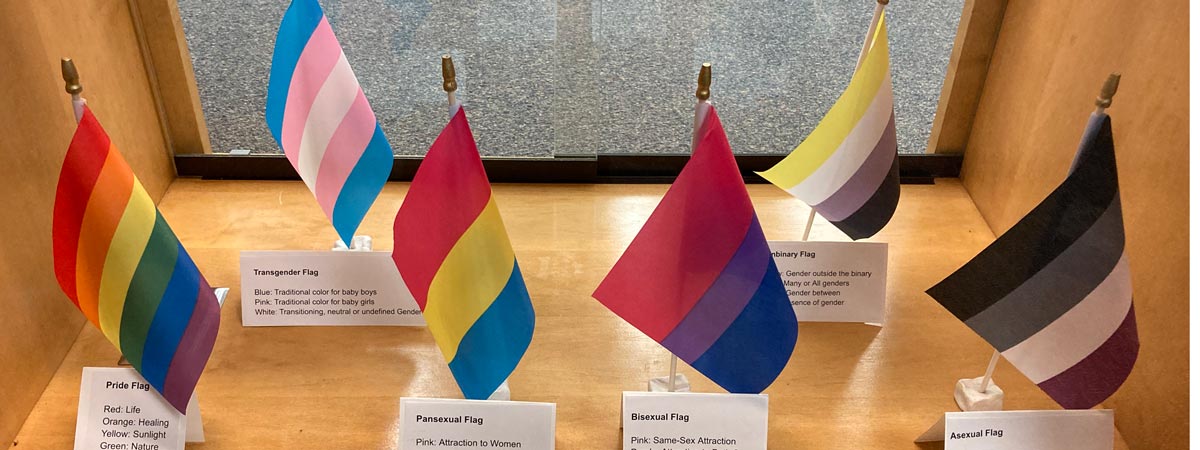
The display in the library includes pride, transgender, pansexual, bisexual, nonbinary, and asexual flags.
Matt Allen '15, who's now pursuing a master's degree in American studies at Nazareth, researched Nazareth's history of graduate studies. Graduate programs started in the 1950s with history, English, and education (including the option to concentrate in music) and evolved to add nursing and physical therapy to meet needs in the community.
"I think it's important to acknowledge the community you service — and the interests of the community you serve," he said. His exhibit included a 1975 handwritten letter from a man in Michigan seeking teaching certification and potentially a master's degree who wanted to be sure Nazareth accepted men. (The answer was yes.)
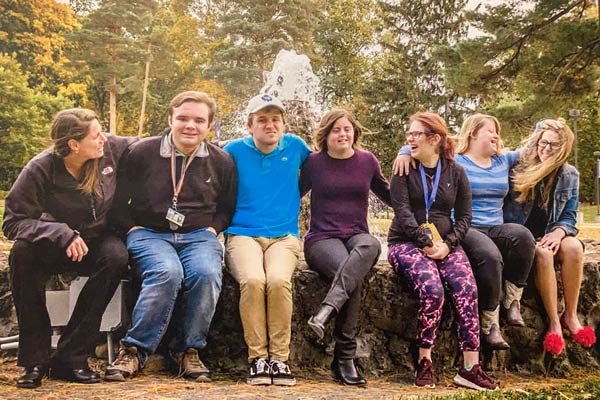
Faculty and staff from Nazareth, Victor Central School District, and The Arc of Monroe County formed the LifePrep@Naz program in 2011 to help individuals continue their education while working towards meaningful employment.
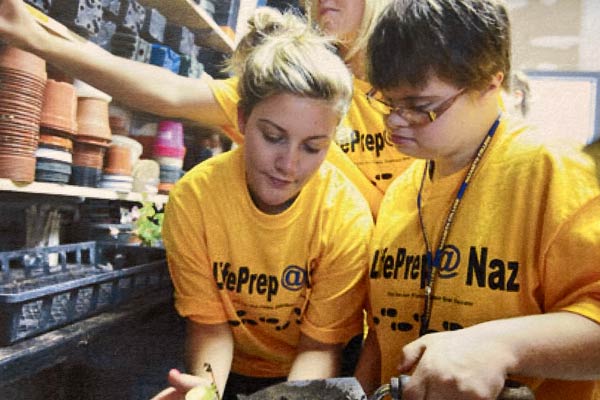
LifePrep@Naz provides a college experience for individuals with intellectual or developmental disabilities and enables meaningful connections and experiences for Nazareth students.
Students who researched Barbara Lum '58, S.S.J. (nursing), pointed out that she and other Sisters of St. Joseph nurses with whom she worked in Selma, Alabama, were inducted into the National Voting Rights Museum & Institute in that city in 2019. They had cared for people of color — including civil rights leader and U.S. Rep. John Lewis — who'd been attacked by state troopers during a peaceful march for voting rights on March 7, 1965, that became known as Bloody Sunday.
"She was so a part of uplifting other people and marginalized voices," said Chiara Osborne '23 (dance studies; museums, archives, and public history).
"And still does," chimed in project teammate Madison Darrell '24 (history; museums, archives, and public history). After retiring from teaching practical nursing at the Rochester Educational Opportunity Center, Lum is involved in community work at St. Joseph's Northside, a neighborhood drop-in center on Lyell Avenue in Rochester.
Kayleigh Hegerle '24 (history; museums, archives, and public history), said the course project was meaningful. "As public history students, it's our duty to bring out those voices."
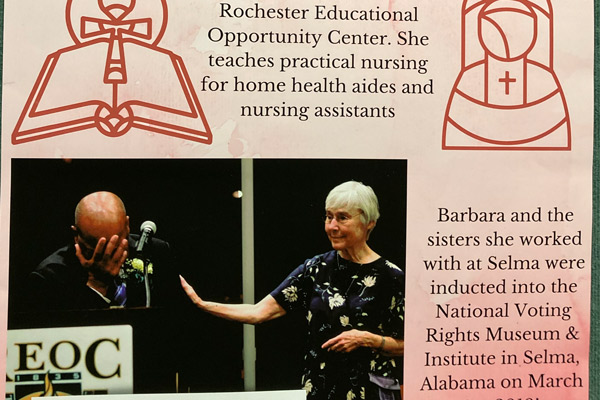
Barbara Lum '58, S.S.J., (shown with Rep. John Lewis in 2014) has had a lifelong career in social justice.
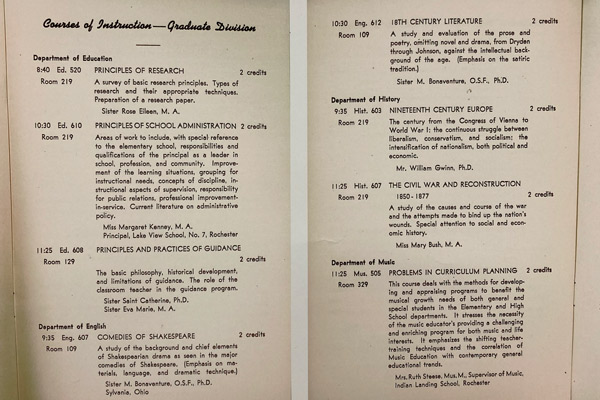
1950s: Nazareth's first graduate programs were in education, history, music, and English.
The students' work is on display through November 2021 at the Lorette Wilmot Library on campus.